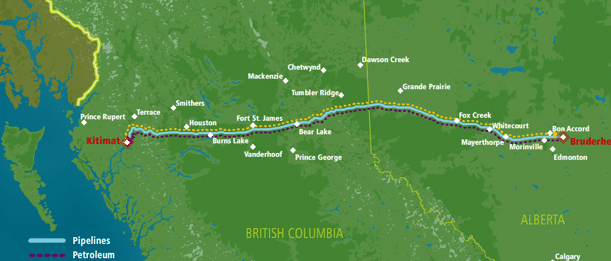The Calgary Herald reports that the decision on the controversial Enbridge Northern Gateway Pipeline was delayed today until late 2013, a year later than planned. The three-member panel said it “would anticipate releasing the environmental assessment report in the fall of 2013 and its final decision on the project around the end of 2013.”
The joint review panel of Environment Canada and the National Energy Board announced that it will take the additional year to review the widespread public concern over the proposed pipeline, which would cut through First Nations lands in order to shuttle the dirtiest oil on the planet, Alberta tar sands, to Asian export markets.
The delay is not a good sign for Enbridge or KinderMorgan, the two major tar sands pipeline interests hoping to enable the export of Alberta’s climate-killing product overseas. As we learned last week, the oil industry will face a powerful adversary since BC’s First Nations pledged, as a united front, to halt construction and prevent the proposed pipelines from crossing their territory.
Marking their commitment against the pipeline projects, 55 First Nations leaders from across
BC signed the
Save the Fraser Declaration. “These First Nations form an unbroken wall of opposition from the
U.S. border to the Arctic Ocean,” said the group in a statement.
In response to the firm commitment of First Nations leaders, federal Natural Resources Minister Joe Oliver said today that Northern Gateway “shouldn’t be held hostage by aboriginal and environmental groups threatening to create a human “wall” to prevent construction,”according to the
National Post article, “
Oil industry’s ‘nation-building’ pipeline won’t be stopped by protesters.”
The joint review panel will begin community hearings in Kitimat, B.C., on Jan. 10 to hear from both sides on this contentious issue. The hearings are sure to attract a lot of attention, and chances are pretty good that much of it will not be favorable to Enbridge or any other proposed tar sands pipeline.
In the wake of the delay and likely demise of the Keystone XL pipeline, all indications point to a difficult, and perhaps insurmountable, challenge ahead for any tar sands pipeline construction.
A massive public movement is mobilizing to repel the incredible threat to the global climate system posed by further development of Canada’s filthy tar sands. Stopping these ill-conceived export pipelines is the first order of business to ensure all of that carbon pollution stays in the ground and that Canada’s boreal forests remain intact.
Chief Jackie Thomas of the Saik’uz First Nation, who also signed the resolution, suggests that, by pushing the pipline projects, Canadian offiicals are running roughshod over their rights.
“Harper wants to force pipelines through BC, ignoring our rights are ignoring the majority of British Columbians. Well I have news for you Mr. Harper: You are never going to achieve your dream of pushing pipelines through our rivers and lands and putting oil tankers on the coast.”
After announcing opposition to the pipeline expansion this summer,
Dene National Chief Bill Erasmus put it this way, “ with over 100 pipeline spill and accidents recorded in Canada over the past two years there is only one thing to say about pipelines: they will spill.”






